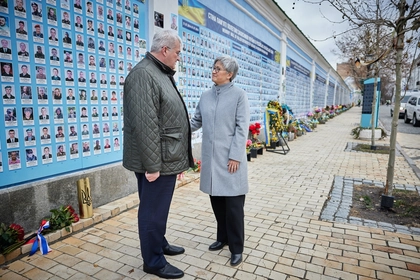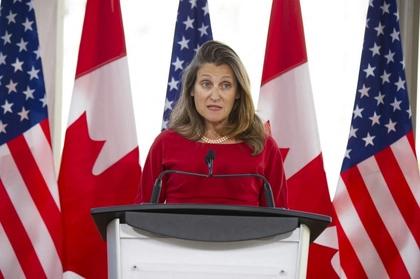From the Editors: With Americans choosing their next president in less than two weeks, Sam Patten’s action-packed memoir Dangerous Company: The Misadventures of a Foreign Agent makes for a timely read.
Convicted during Donald Trump’s last presidency of violating the Foreign Agent Registration Act over his work for a Ukrainian political party. Patten cooperated with the investigation of Russia’s role in the 2016 US presidential election and, unlike figures such as Paul Manafort, didn’t seek a pardon from Trump.
JOIN US ON TELEGRAM
Follow our coverage of the war on the @Kyivpost_official.
On the eve of yet another US election, the former political consultant and now writer spoke with the Kyiv Post’s Jason Smart about his book and the current mood in America – outside “the Beltway.”
“Right now, a lot of Americans wish they could vote ‘against all.’ Having spent much of my career between countries and between political sides, this environment feels eerily familiar,” Sam Patten says, speaking from his home state of Maine, where he returned to from Washington after completing the probationary sentence, he received for his Foreign Agent Registration Act (FARA) violation.
For someone like him, going back to rural America seemed like a radical departure from a career spent either embedding in foreign countries, or scoping out new opportunities from Capitol Hill. But as he describes it, it is also a welcome reprieve from life spent in the midst of, as his book is titled, dangerous company.

Australian Foreign Minister Visits Kyiv, Confirms Reopening of Embassy
Patten relates that he had been the International Republican Institute’s (IRI) Country Director in Moscow, where he had worked closely with the late opposition leader Boris Nemtsov. From there, he had gone to Baghdad to run IRI’s political training operation just before Iraq’s historic 2005 elections.
At the end of the second George W. Bush administration, Patten worked as a senior advisor to undersecretary of State Paula Dobriansky, so between these various experiences, he had a fair amount of experience in the democracy promoting world that eventually led to him landing a senior role at Freedom House, the democracy and human rights watchdog, he says.
Patten pays respects to his late friend Boris Nemtsov in 2016.
But after that, Patten launched into another aspect of his career that he describes in his book as becoming a “gun for hire” or political mercenary. This took him back to Iraq, to Georgia, to Africa for the London-based consultancy Cambridge Analytica, and to Ukraine, where he worked on multiple political accounts. It was this track that landed him ultimately in the crosshairs of Special Counsel Robert Mueller’s probe of whether Trump’s 2016 campaign had in any way conspired with Russia, and to his conviction for failing to register as a foreign agent for the Opposition Bloc in connection to his work for Ukrainian oligarch Serhiy Lyovochkin.
“I came back to Ukraine several months after Maidan, at Kostya’s invitation,” he recalls, referring to his one-time deputy in the IRI Moscow office, Konstantin Kilimnik, who became a target of Mueller’s probe.
When Patten went to Iraq, Kilimnik went to Kyiv to work for Paul Manafort, who had just been hired by Viktor Yanukovych’s Party of Regions. (Later Manafort would become Donald Trump's campaign manager and subsequently convicted for fraud related to his work with Yanukovych. Ultimately he was pardoned by Trump himself.) “It might sound like a strange choice for a former democracy promoter, but in 2014, the Opposition Bloc were very much the underdogs, and I saw a challenge there,” Patten said.
Prior to this, in 2007, he worked as a media consultant to Viktor Yushchenko’s Nasha Ukraina party and afterwards as a strategist to Kyiv Mayor Vitali Klitschko in his 2015 re-election campaign, so his Ukrainian political bona fides are diverse, to put it mildly. Also in Georgia, Patten initially worked for Mikheil “Misha” Saakashvili’s political party in 2008 only to return three years later as an advisor to the coalition that unseated Misha.
Patten coaches Kyiv Mayor Vitali Klitschko, 2015
Of all the countries in which he’s worked, Patten says he has a special affinity for Ukraine, and perhaps this is fitting given it’s the one for which he bears a criminal conviction back at home.
“From my first visit in 2007 to my most recent in 2022, Ukraine has inspired intense and sometimes conflicting emotions in me, and I’m not ashamed to say that more than once I’ve wept when leaving,” he told me, adding: “I do hope to go back and be useful one day.” On his last visit, a month after the Russian invasion, he carried in short-wave radios for use by territorial guard units.
Finding his way forward since what he calls “Russia-gate” has not been easy. In an apparently random attack in 2020, an assailant in Washington, DC stabbed him eight times in the head and back in broad daylight on a busy downtown street. Amazingly, he survived without serious, lasting injury.
“I suppose that was God’s way of telling me to get the hell out of town,” he reflects ruefully.
While Mueller ultimately concluded the Trump campaign did not take part in a criminal conspiracy with Russia in 2017, despite systemic Russian interference in the election, and a subsequent special counsel found significant concerns of domestic political subterfuge at the root of the investigation, Patten says he is trying with time not to be bitter about his fate.
“Politics can be a dirty and indeed rough business, and as the old saying goes ‘if you live by the sword, you die by the sword,’” he philosophizes, adding “I guess I’m lucky that so far this has only applied figuratively to me. Over the course of interfering with other countries’ politics, I’ve learned a thing or two and that’s why I wrote the book. Something tells me though there is more to come.”
According to court documents, past interviews and his book, Patten has voted against Trump twice. When I asked him what he is going to do next month, he just smiled and said he planned on voting despite his frustration with the choice at the top of the ticket because, as he put it, there are a lot of down ballot issue he cares about. Currently, Patten writes about various issues – including Ukraine – for The Maine Wire, a conservative outlet in his home state.
You can also highlight the text and press Ctrl + Enter









